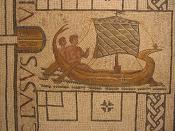Christianity's Affect on Roman Virtue "What?!"ÃÂ "You only killed eight men?! You're out of the family!!"ÃÂ Although life in the Roman Republic and the Roman Empire wasn't this drastic, Roman virtue and morals were taken very seriously. "These include tenacity, duty, courage, and especially discipline"ÃÂ (Spielvogel, 89). Romans valued highly the honor of one's family and the amount of courage one exhibits in battle. This fact is evident, as one can see in Rome's history, because men with a history of military achievement held almost every official position. The rise of Christianity in the second, third, and fourth centuries, however, had an impact on the alteration of the idea of Roman virtue. Christianity and its teachings appealed to many Romans for various reasons, and it was this appeal that allowed Christianity to grow and take over the lives of Romans in the fourth century when Emperor Constantine became the first Christian emperor.
The rise in popularity of the Christian religion was at its peak in the fourth century. This is when the religion began to appeal to nearly all Roman people.
Finally, Christianity fulfilled the human need to belong. Christians formed communities bound to one another in which people could express their love by helping each other and offering assistance to the poor, sick, widows, and orphans. Christianity satisfied the need to belong in a way that the huge, impersonal, and remote Roman Empire could never do. Christianity proved attractive to all classes. The promise of eternal life was for all-rich, poor, aristocrats, slaves, men, and women (Spielvogel, 126).
This sudden appeal caused the main religion of the Roman people to eventually become Christianity. It was this eventual change that caused the deterioration of Roman virtue. By converting to the beliefs of Christianity, the Roman people made a...



Good
A nice and informative essay on the subject.
0 out of 0 people found this comment useful.